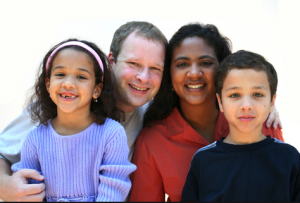 This new research, published in Personality and Social Psychology Bulletin, found that a positive, mutually supportive and sensitive love relationship was associated with positive, supportive and nurturing behavior towards one’s children. This is one of those “demonstrating the obvious” studies that I “love” from academic researchers, who always sound amazed at their “discoveries.” But it’s good for convincing people who are skeptical about believing their own experience and what they see around them.
This new research, published in Personality and Social Psychology Bulletin, found that a positive, mutually supportive and sensitive love relationship was associated with positive, supportive and nurturing behavior towards one’s children. This is one of those “demonstrating the obvious” studies that I “love” from academic researchers, who always sound amazed at their “discoveries.” But it’s good for convincing people who are skeptical about believing their own experience and what they see around them.
I think the upshot of this “new” finding is that everything is connected in our lives — how we think, feel, relate, behave — are all part of an interconnected whole. The problem is that our life experiences often generate fragmentation, isolation, retreat into ego attachments which disconnect us from ourselves, within; and from others.
But to get to the research: The lead author, Abigail Millings of the University of Bristol, commented in a summary published in Science Daily, that the study sought to examine how caregiving plays out in families — “…how one relationship affects another relationship. We wanted to see how romantic relationships between parents might be associated with what kind of parents they are. Our work is the first to look at romantic caregiving and parenting styles at the same time.” Previous studies had looked at similar caregiving processes within romantic relationships or between parents and children, but rarely for both groups.
The research found – no surprise – that “a common skill set underpins caregiving across different types of relationships, and for both mothers and fathers. If you can do responsive caregiving, it seems that you can do it across different relationships.”
Millings added, “It might be the case that practicing being sensitive and responsive — for example, by really listening and by really thinking about the other person’s perspective — to our partners will also help us to improve these skills with our kids.”
Well, yes…
The full summary of the research in Science Daily:
Being a good partner may make you a better parent, according to a new study. The same set of skills that we tap to be caring toward our partners is what we use to nurture our children, researchers found.
The study sought to examine how caregiving plays out in families — “how one relationship affects another relationship,” says Abigail Millings of the University of Bristol, lead author of the work published online this week in Personality and Social Psychology Bulletin. “We wanted to see how romantic relationships between parents might be associated with what kind of parents they are.”
Previous research had looked at similar caregiving processes within romantic relationships or between parents and children, but rarely for both groups. “Our work is the first to look at romantic caregiving and parenting styles at the same time,” Millings says. Looking at 125 couples with children aged 7 to 8 years, the study, carried out at the University of East Anglia, examined a few factors: the way the couples are attached toward each other; the parenting styles they use with their children; and their “caregiving responsiveness.” Caregiving responsiveness is the “capacity to be ‘tuned in’ to what the other person needs,” Millings says. “In romantic relationships and in parenting, this might mean noticing when the other person has had a bad day, knowing how to cheer them up, and whether they even want cheering up.” And, she says, it’s not “just about picking you up when you’re down, it’s also about being able to respond appropriately to the good stuff in life.”
They found that a common skill set underpins caregiving across different types of relationships, and for both mothers and fathers. “If you can do responsive caregiving, it seems that you can do it across different relationships,” Millings says. Surprisingly, however, the researchers found that how you care toward your partner does not relate to how your partner behaves as a parent. Millings also underscores that the data do not yet speak to what causes our caregiving toward our partners to be mirrored in our caregiving for our children, or if it’s the other way around. “It might be the case that practicing being sensitive and responsive — for example, by really listening and by really thinking about the other person’s perspective — to our partners will also help us to improve these skills with our kids,” she says. “But we need to do more research to see whether the association can actually be used in this way.”
And she points out that parents can have great relationships with their children without having a partner. Her team would therefore like to explore how caregiving and parenting relate to one another in other family structures. If they find that improving caregiving responsiveness in one relationship does indeed improve relationship functioning elsewhere, it may be possible to use this idea to design a self-help program that enables people to improve their own relationships.
